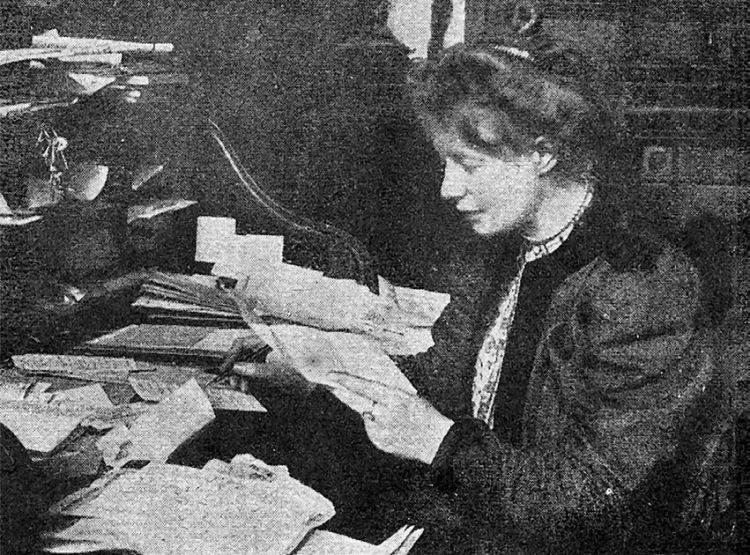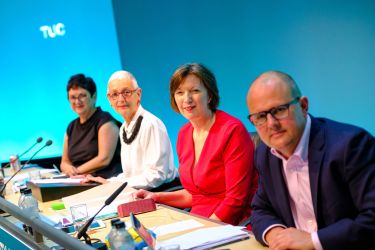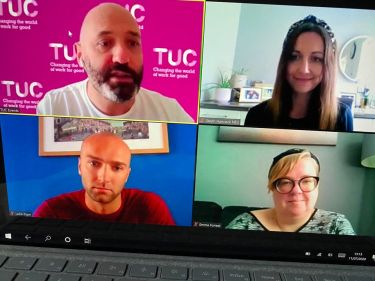General Council Report 2021
6.1 Developing the TUC
We’ve continued to develop the TUC through the second lockdown and beyond. But we’ve delivered differently and against a backdrop of continued uncertainty.
Our people, learning and development
We can fulfil our important mission only if our people are happy and able to deliver. In many ways the second wave of coronavirus and the prolonged lockdown was more challenging than the first.
We continue to support staff who have been directly affected by sickness, bereavement and extreme, extended pressures in their working and family lives. Most staff continued to work from home and we used the government’s job retention scheme to furlough staff who could not work because their jobs were directly affected by the pandemic.
We maintained some additional flexibilities to help our staff remain productive and began a review of flexible working and its impacts, consulting closely with staff and reps, to co-design a future where more staff are likely to spend more time working from home.
After a delay due to the pandemic, we began a period of reflection working with consultants and our Black and minority ethnic (BME) staff to better understand the barriers to staff inclusion and development at the TUC. This built on ongoing work looking at the barriers to recruitment, promotion and development.
We were sad to see staff depart under redundancy schemes, whether those who elected to take voluntary redundancy from Estates and Congress Centre teams most impacted by Covid restrictions or those affected by the end of our unionlearn grant. We continue to look carefully at vacancies as they arise, reshaping or moving posts to best meet the demands on the TUC.
In September 2020, Head of Equalities and Strategy (ESD) Nicola Smith left the TUC for a new post at the Nursing and Midwifery Council. We were pleased to welcome Kudsia Batool to the head of ESD post.
Martin Mansfield, Wales general secretary, had been on secondment to the Welsh government for the year and has taken up a new position there working on standards in the social care workforce. Shavanah Taj, who had been covering Martin’s secondment, was confirmed as general secretary of TUC Wales in June. Beth Farhat, regional secretary of Northern Region, is also leaving us for a new position with an affiliate. We wish all our leavers well for the future.
IT strategy and information services
Both teams were very busy supporting remote working over the period. Much of the year focused on a new tender for IT services, which enabled us to make significant savings for the TUC. We strengthened our internal communications, building on past developments.
The information line supported nearly 4,894 public enquiries in 2020, of which 55 per cent were from people who wanted to know how to join a trade union. The pandemic and worries about safety and job security drove even more working people to find out about joining a union.
Congress House – managing our estates
We actively manage Congress House to make best use of the building for the TUC and the wider trade union movement. Two of our tenants had to leave us at short notice facing bankruptcy due to the pandemic. We re-let one area and continue to seek more tenants for the vacant space in the building. We restarted our delayed programme of works to update and maintain Congress House.
Congress Centre – a valued venue
Over the years, the TUC and its affiliates have enjoyed the wide range of meetings, conferences and events hosted by Congress Centre. It was very sad to close the doors during lockdown after recent huge success. We have brought in very limited income, providing filming locations and hosting online events under strict Covid-secure conditions. We continue to rely on job retention scheme support but, because of our experience in hosting hybrid meetings and our thorough approach to health and safety, we remain positive about the future once pandemic conditions allow.
Affiliations and mergers
There were no affiliations or mergers to the TUC in 2020–21.
6.2 Congress awards
Congress Award for Youth
Lois McCallum
Unite
Health and Safety Rep Award
Katrina Humphreys
Chartered Society of Physiotherapy
Organising Award
Jake McLean
GMB
Women’s Gold Badge 2020
Sian Stockham
UNISON
Women’s Gold Badge 2021
Millie Apedo-Amah
National Union of Rail, Maritime and Transport Workers
Union Learning Rep Award 2021
Collina Angus
UNISON
Recipients of special commendation for health and safety for work during the pandemic
Dele Akinfolarin
GMB
Grant Biggerstaff
Community
Alice Butterton
National Education Union
Brett Cornwell
Unite
Michelle Hargreaves
Union of Shop, Distributive and Allied Workers
Jai Lusser
Prospect
Nicolae Macari
Bakers, Food and Allied Workers’ Union
Khalid Rana
ASLEF
Willie Strang
National Union of Rail, Maritime and Transport Workers
6.3 Congress
The 2020 Congress was held online, with the business of Congress passed by an extended meeting of the General Council. Congress carried 33 resolutions, 15 composites and 1 emergency resolution. It also agreed General Council statements on anti-racism, the economy, safe working, the unequal impact of coronavirus, and a global recovery. In June the Executive Committee agreed temporary changes to standing orders to allow the 2021 Congress to be held online.
6.4 General Council
At the time of writing, the General Council has held seven meetings during the Congress year. At the first meeting, held jointly with the outgoing General Council of the 2020 Congress, Gail Cartmail was elected as chair and she will preside at the 2021 Congress. It was agreed that the Executive Committee should be composed of the existing members (apart from Christine Payne and Chris Keates, who were retiring), with the addition of Patrick Roach and Michelle Stanistreet.
Dave Prentis retired from the General Council in December 2020 and was replaced by Christina McAnea in February 2021. Christina McAnea also joined the Executive Committee at that point. In June 2021, Mick Lynch replaced Mick Cash, and Isabelle Gutierrez resigned from the General Council.
During the course of the year, key themes in the General Council’s work have been coronavirus, the future of working, preventing mass unemployment, anti-racism and sexual harassment.
The General Council lead responsibilities for the year 2020–21 have been as follows:
Overall responsibility as lead spokesperson for the TUC
General Secretary, Frances O’Grady
Senior representative throughout the Congress year
The President, Gail Cartmail
Specific areas of responsibility
Digital
Mary Bousted and Kevin Courtney
Disabled workers
Dave Allan
Employment rights
Tony Burke
Environment and sustainable development
Sue Ferns
Europe
Steve Turner
Health and safety
Liz Snape MBE
International development
Gail Cartmail
International relations
Kevin Courtney
Learning and skills
Mary Bousted
Lesbian, gay, bisexual and transgender rights
Maria Exall
Public services
Dave Prentis (until December 2020), Christina McAnea (from February 2021)
Race equality
Gloria Mills MBE
Trades union councils
Steve Gillan
Women
Sue Ferns
Young workers
Charlie Gray
6.5 Conferences
Due to the pandemic, TUC statutory conferences took place online, with extended committee meetings taking care of the democratic business and governance arrangements.
Women’s Conference
The public sessions of Women’s Conference debated statements on three key themes: the unequal impact of Covid-19 on women, ending gender-based violence and harassment, and strengthening women’s rights and representation at work.
The conference was addressed by Frances O’Grady, and Women’s Committee chair and General Council member Sue Ferns. There were panel discussions on: working women; learning, support and wellbeing for women in the community; Mary Macarthur and the women chainmakers; ending inequalities in Black women’s maternal health care; empowering women through place-led change; and strengthening women’s rights and representation at work. There were interactive workshops on: intersectional organising; preventing sexual harassment in the workplace; workplace support for survivors of domestic abuse; organising for equal pay; and health and safety.
Lesbian, Gay, Bisexual and Trans+ Conference
The LGBT+ Conference held four debate sessions on: statements on the Gender Recognition Act; supporting non-binary members at work; the impact of Covid-19 on the mental health of the LGBT+ community; and the unequal impact of Covid-19 on LGBT+ workers.
The conference was addressed by Frances O’Grady, TUC President Gail Cartmail, TUC LGBT+ Committee chair and General Council member Maria Exall, Chief Executive of Stonewall Nancy Kelley and Shadow Minister Charlotte Nichols. There were two well-received panel discussions on Black Lives Matter and on international LGBT+ rights.
Disabled Workers Conference
The Disabled Workers’ Conference held public debate sessions on statements on the unequal impact of Covid-19 on disabled workers and people and reasonable adjustments.
The conference was addressed by Frances O’Grady, Disabled Workers’ Committee co-chair and General Council member Dave Allan, TUC President Gail Cartmail, Shadow Minister Vicky Foxcroft and Rachel O’Brien of Inclusion London. The conference also held a thought-provoking panel discussion on the role of visibility in tackling disability discrimination.
Black Workers Conference
The Black Workers Conference held webinars on: the trade union response to racism; Making Black Lives Matter; and race, Covid-19 and the vaccine. Four workshops were also jointly run with TUC Anti-Racism Taskforce members to engage Black workers with the Taskforce work.
Young Workers Conference
The Young Workers Conference debated the urgent need to stop mass unemployment with a panel discussion including Equity General Secretary Paul Fleming, and how Covid-19 has hit the lives of young people. Frances O’Grady, Shadow Minister Charlotte Nichols, and Wales TUC General Secretary Shavanah Taj addressed the conference and answered questions on getting active in our unions, organising around key issues and how we must tackle racism.
Trades Councils Conference
Participants at the Trades Councils’ Conference heard keynote speeches from Frances O’Grady and from the chair of the Anti-Racism Taskforce, Patrick Roach. TUCJCC members led panel discussions on a fairer, better, greener recovery, tackling racism, and campaigning for workplace safety, with additional speakers including Colin Hampton (Chesterfield UWC) and Janet Newsham from Risks.
6.6 TUC finances
The annual statement of accounts and balance sheet as at 31 December 2020 is set out in Appendix Three. It shows a total deficit across all funds of £10.047m, including asset revaluations and FRS102 pension accounting adjustments. The pandemic meant big variances to our income and expenditure from budget in a difficult year for financial management. The operating surplus on ordinary activities of £947,000 comprises surpluses of £157,000, £162,000, £428,000 and £200,000 on the administration, development, unionlearn and Congress House dilapidations funds respectively.
Development fund
In 2020, 10 per cent of the affiliation fee was allocated to the development fund, alongside some external funding, and was used to promote new work (including on Covid-related campaigning) and General Council initiatives. This was used to support a variety of projects, the main initiatives being:
- growing the union movement
- a new deal for working people
- rebuilding a UK that works for working people after Brexit
- digital campaigning.
The development fund, representing all non-unionlearn externally funded projects together with projects funded by the affiliation fee, showed an operating surplus of £162,000.
Statement of accounts
The administration fund (covering day-to-day office-running expenses and staff costs) produced a surplus on ordinary activities of £157,000. We lost income from our Congress Centre and Congress House letting activity but the impact of staff costs was reduced by claims from the Job Retention Scheme and we made savings on expenditure from online meetings (including Congress) and other savings. The unionlearn fund produced a surplus of £428,000, which reflects flows at that point of the year; any surplus when the fund closes will be returned to the DfE. The development fund is shown above, while during the year £200,000 was transferred to the dilapidations fund from the administration fund.
During 2020, our calculated FRS102 pension scheme position moved from a £10,297,000 surplus to £4,913,000. This negative movement of £5,384,000, together with the operating surplus of £947,000, the gain of £246,000 on sale of investments, net revaluation and deferred tax reduction of £5,856,000, has decreased the funds of the TUC from £84,952,000 to £74,905,000.
Prospects and developments
A budget for the 2021 administration fund has been agreed by the General Council. This showed a projected deficit of £156,480 but efforts are continuing to minimise any shortfall. The General Council approved a four pence (1.35 per cent) increase in the affiliation fee to £3.01 for 2021.
The TUC has retained its Fair Tax accreditation.
6.7 Library collection

Located at London Metropolitan University, the TUC library collection provides a wide range of resources on both the history and the current activities of trade unions, industrial relations, labour history and adult education.
Six exhibitions are currently available to loan, the latest on the life of Mary Macarthur. The others are on the history of young workers; 150 years of the TUC; the 1984/85 Miners’ Strike; the Russian Revolution; and American and British labour relations.
Our educational history websites – The Union Makes Us Strong, Workers’ War, Winning Equal Pay and Britain at Work – contain image archives and oral history and can all be accessed from www.unionhistory.info/
TUC Library can be found on social media at:
Enquiries, visits and inductions are very welcome and can be organised through Jeff Howarth at:
London Metropolitan University
The Wash Houses
Old Castle Street
London E1 7NT
tuclib@londonmet.ac.uk
020 7320 3516
Stay Updated
Want to hear about our latest news and blogs?
Sign up now to get it straight to your inbox


